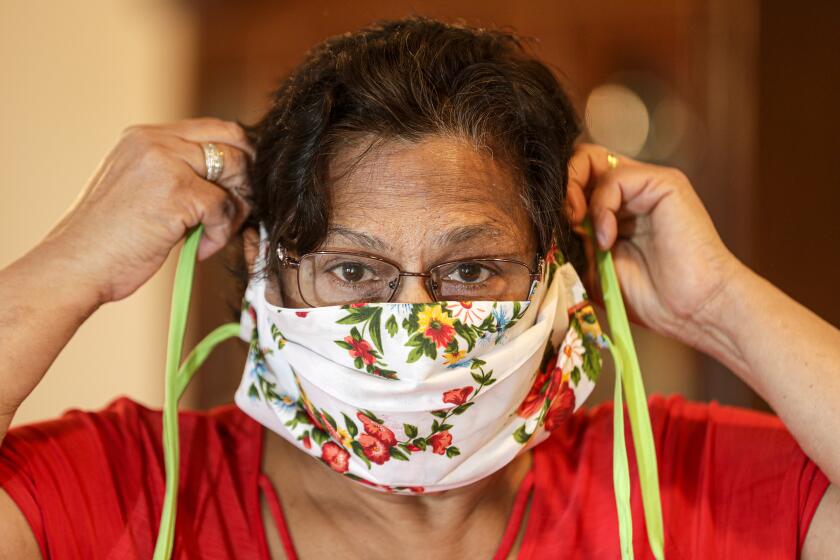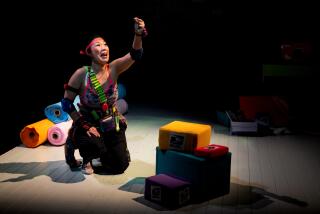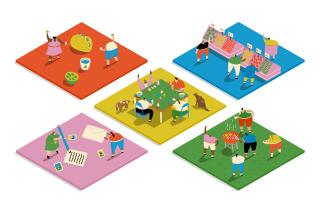Three sisters set aside a dressmaking rivalry to kick coronavirus butt

- Share via
For years, the Cerpas sisters engaged in friendly competition. All three ran their own dress shops, the eldest from her home in Corona and the two youngest just a block away from each other in downtown Santa Ana’s 4th Street district.
They sold gowns marking life passages: baptisms, communions, quinceañeras and weddings. A few years ago, Lilia Cerpas, the middle sister, opted to stand out from the rest and added the word “boutique” to the end of her shop’s name to lure a more affluent clientele.
But in mid-March, business dried up for the sisters as the coronavirus spread to Southern California. Lilia Cerpas, 57, fielded calls from brides who had postponed their weddings. Mothers called off communions, birthday parties and quinceañeras. She was stuck with the dresses and only half the payment. Her two sisters, Patricia Cerpas, 59, and Vicky Cerpas, 51, also watched their orders and incomes plummet.
“What am I going to do?” Lilia thought. “I’ll have to close.”
But a few days after she shuttered her store, Lilia got a call from a friend at the Santa Ana Business Council who told her about designers in New York City crafting fabric face masks. Her friend encouraged her to do the same.
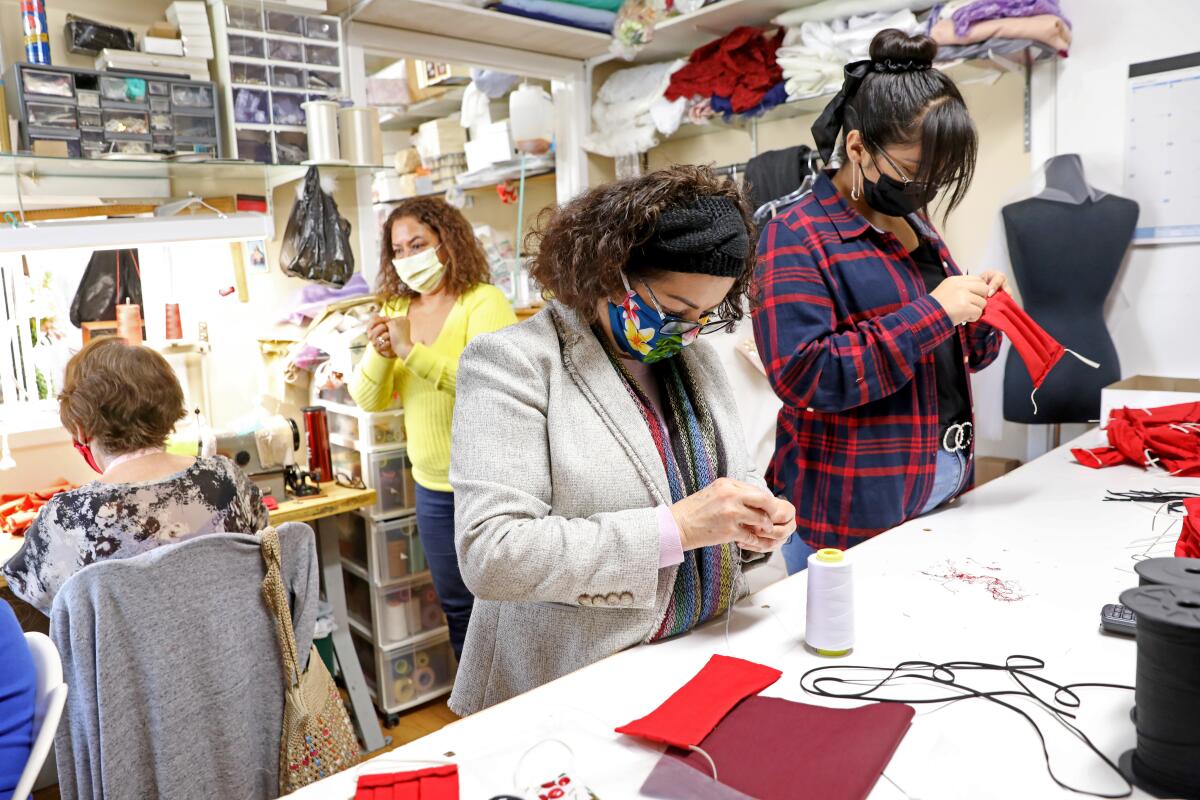
“Yes!” Lilia said immediately. But she was low on cash and the month’s rent was due. She’d have to reach out to her sisters.
Lilia reminded them of what their mother, a clothing designer, used to say: “Nothing ventured. Nothing gained.”
After a bit of convincing, the two sisters were in. They set aside their “friendly rivalry” and for the first time in many years are in business together.
The three sisters grew up among the hum of sewing machines and mountains of fabric in their mother’s dress shop in Apatzingán in Mexico’s Michoacán state. They helped their mother in her shop, and she taught them how to sew at an early age.
The sisters have always been close, despite being quite different.
The latest updates from our reporters in California and around the world
Lilia always has been the most impulsive. She’s known as the risk-taker — redesigning her shop and forgoing the more traditional ruffled dresses a few years ago to appeal to downtown 4th Street’s younger arrivals, a more affluent — and predominantly non-Latino — clientele. To finance the sisters’ new mask-making venture, she nearly maxed out her credit card for supplies and materials, such as fabric, elastic and thread.
The youngest sister, Vicky, is more cautious and calculating. For years, she hesitated to launch her own shop. Instead, she partnered with her older sister, Patricia. She took over one of her sister’s shops and Patricia eventually moved her business to her home in Corona.
The store hasn’t changed much since then. It’s more traditional, the kind of place where colorful, fluffy and embellished quinceañera dresses take center stage. For their new joint project, Vicky said she would follow Lilia’s lead and was willing to lend a hand and work the sewing machines. But she was too scared to invest any of her own money.
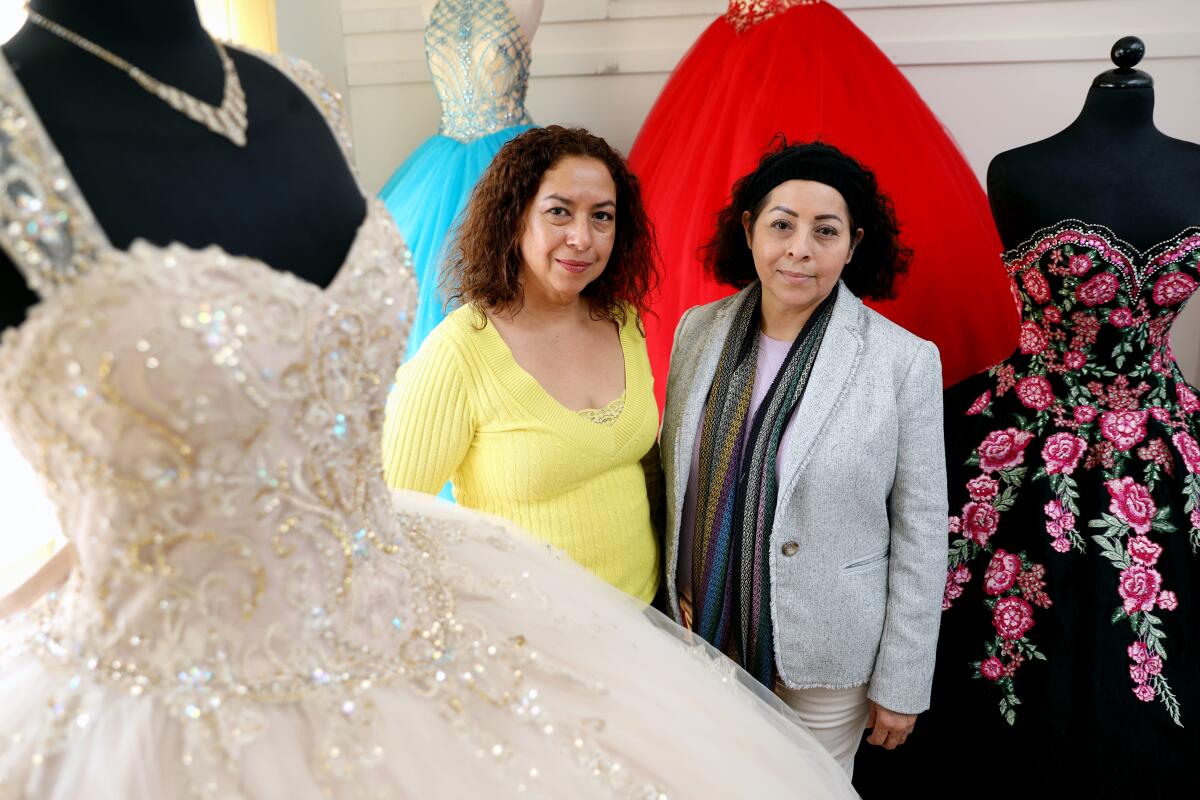
Patricia is the trailblazer — the first to move to the United States in the 1980s to open her shop on 4th Street. Her younger sisters followed her to Santa Ana, and all three worked together for a few years before Lilia set off on her own.
For the trio’s new venture, Patricia bankrolled the payroll with an infusion of cash, Lilia said. Patricia is also the most reserved and private, her sisters said, so much so that she declined an interview for this story.
“She’s always been quiet,” Vicky said. “She is the shy one.”
Most of the face masks are made in a room the size of a walk-in closet just across a long hallway that connects with Lilia’s second-floor shop on Broadway, just off 4th Street.
A large table with mounds of fabric cut into squares, a sewing machine and ironing board are crammed in between bedazzled bridal gowns ready for pick up. The gowns had yet to meet their brides because the coronavirus postponed those weddings.
With the help of two assistants, Patricia makes a few of the masks from her home in Corona, her sisters said. Lilia’s son drives up a few times a week to pick them up.
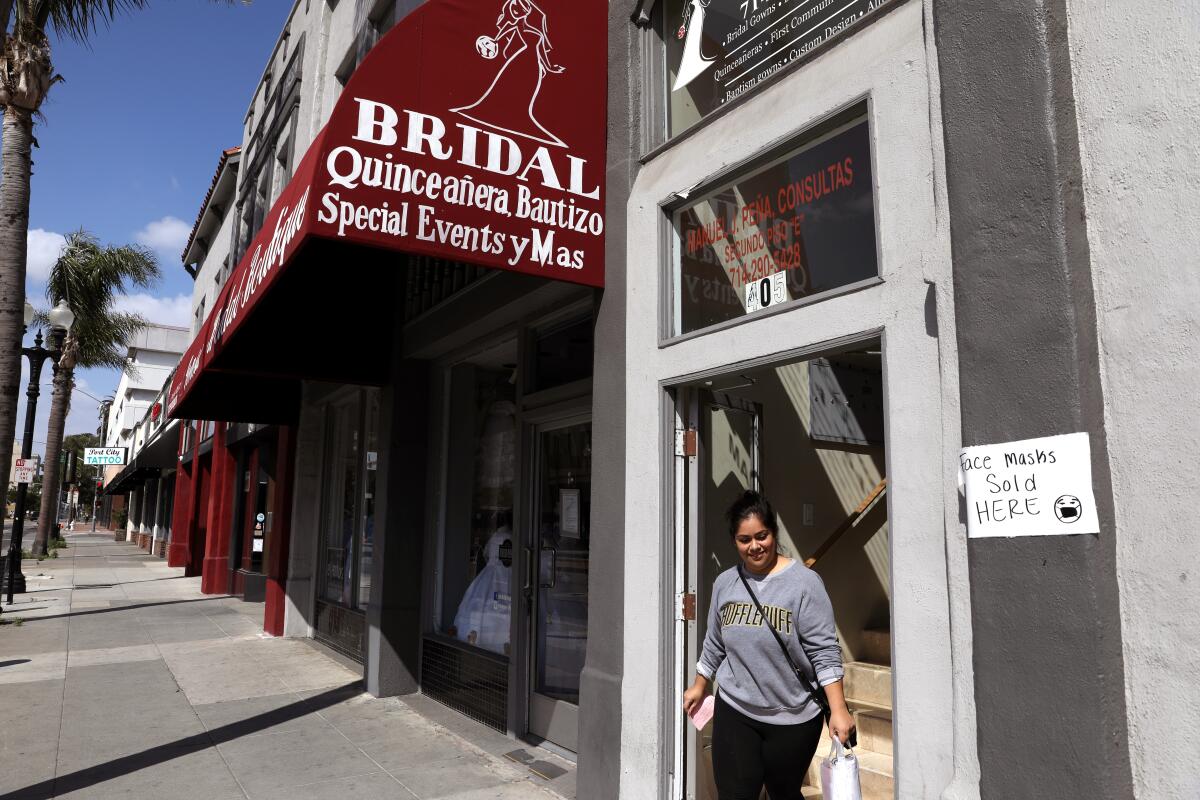
Wearing masks or other face coverings is now recommended as one way of slowing the spread of the coronavirus.
On most days, Lilia and Vicky are shuttered inside the workshop from morning to late nights, sometimes as late as 11 p.m.
In their sewing refuge, they shut out the world and news about the virus. They forget about how a once-bustling 4th Street has suddenly become deserted and how security grates line the windows of most stores.
The sisters lose themselves in the rhythmic clatter of the sewing machine mixed with whatever Spanish-language crooner happens to be emanating from their radio. Sometimes they forget to eat. Their focus is on the task at hand, which can be taxing but also therapeutic, the sisters said.
“We lose track of time,” Lilia said.
On a recent weekday, Lilia ironed perfect pleats into a burgundy-colored piece of fabric. A couple of steps away, Vicky took charge of the sewing machine, fusing the fabric’s edges with a vertical stitch.
Vicky’s daughter, Victoria Lopez, 18, answered calls and attended to a couple who had dropped by the shop to buy a few pairs of face coverings. The stairs leading to the upstairs shop are marked with blue tape — six feet apart — for social distancing guidance.
From the Los Angeles Times: Coronavirus in California: Stories From the Front Line is a daily 15-minute podcast hosted by reporter Gustavo Arellano.
The sisters and Lopez wear masks. Every night, they disinfect the shop with Lysol, the sisters said.
As of Tuesday, they had sold more than 5,000 face coverings. Lopez manages the shop’s Instagram account, responding to messages and posts whenever she isn’t picking up the phone, which is constantly ringing with people wanting to place orders. Sometimes she also sews, helping her mother finish off the masks.
The masks are simple, double-pleated, and washable. The fabric is a cotton blend — 80% cotton and 20% polyester — to keep costs down but not sacrifice quality, Lilia said.
“I wanted to make them as affordable as possible so people can protect others and themselves,” Lilia said.
They sell at $7.50 apiece, and discounts are offered for larger orders. Hospital administrators and restaurant workers have placed most of the orders. The sisters said they also donated some to local families and a few police officers.
The venture has become a family affair, particularly after two of Lilia’s seamstresses left to make their own face masks.
“I don’t fault them,” she said. “Now it’s just family. It’s a difficult situation, but we have to have faith in God.”
Finding affordable fabric has also become a struggle. Prices spiked recently, prompting Lilia to make a drive to Los Angeles in the rain to hunt for reasonably priced cloth.
The sisters look for bright and fun fabric. Some masks showcase yellow and pink flowers splattered on a royal blue background. Others feature white dots scattered on black or blue. A few depict speckled purple and pink reindeer standing at attention — those are nearly sold out.
“We try to have nice and joyful designs, so people feel uplifted,” Vicky said. “We don’t want people to feel like they are sick. We chose happy colors.”
She said it feels good to create a product that helps people protect their loved ones and themselves. The best part is getting to work alongside her adult nephews and sisters; the hardest part is that the family is used to greeting each other with embraces and pecks on the cheek.
“We love to hug, but now we can’t. It’s not recommended,” Vicky said. “It’s hard to demonstrate our love for each other without hugging.”
So, for now, they keep their distance.
More to Read
Sign up for Essential California
The most important California stories and recommendations in your inbox every morning.
You may occasionally receive promotional content from the Los Angeles Times.
